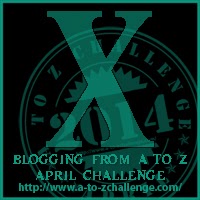This was the most difficult day to come up with a topic for, because there just aren’t that many writing terms that begin with X. I went with Xanaduism because the name is derived from a poem I enjoy. Here’s a definition provided by Dr. L. Kip Wheeler of Carson-Newman University.
Academic research that focuses on the sources behind imaginative works of literature and fantasy. John Livingstone Lowes, in his publication The Road to Xanadu (1927), inspired the name, which in turn goes back to Coleridge’s visionary poem “Kubla Khan” (i.e., “In Xanadu did Kubla Khan a stately pleasure dome decree . . .”). More recently, the term has been used in a pejorative sense to describe scholarship involving dubious scrutiny of amorphous, difficult-to-prove sources, especially simplistic studies lacking any redeeming theoretical perspectives
So, if you write an essay about the orgin of a piece of literature and someone says you’re engaging in Xanaduism, they’re probably not complimenting you on your scholarship. I’ve never actually heard this term used in conversation, and don’t have anything else to say about it.
Since Coleridge’s “Kubla Khan” is in the public domain, I’ve included it below for your enjoyment, with another thought or two afterwards. Librivox has several audio recordings of this poem.
In Xanadu did Kubla Khan
A stately pleasure-dome decree:
Where Alph, the sacred river, ran
Through caverns measureless to man
Down to a sunless sea.
So twice five miles of fertile ground
With walls and towers were girdled round:
And there were gardens bright with sinuous rills,
Where blossomed many an incense-bearing tree;
And here were forests ancient as the hills,
Enfolding sunny spots of greenery.
But oh! that deep romantic chasm which slanted
Down the green hill athwart a cedarn cover!
A savage place! as holy and enchanted
As e’er beneath a waning moon was haunted
By woman wailing for her demon-lover!
And from this chasm, with ceaseless turmoil seething,
As if this earth in fast thick pants were breathing,
A mighty fountain[1] momently[2] was forced:
Amid whose swift half-intermitted burst
Huge fragments vaulted like rebounding hail,
Or chaffy grain beneath the thresher’s flail:
And ‘mid these dancing rocks at once and ever
It flung up momently the sacred river.
Five miles meandering with a mazy motion
Through wood and dale the sacred river ran,
Then reached the caverns measureless to man,
And sank in tumult to a lifeless ocean:
And ‘mid this tumult Kubla heard from far
Ancestral voices prophesying war!
The shadow of the dome of pleasure
Floated midway on the waves;
Where was heard the mingled measure
From the fountain and the caves.
It was a miracle of rare device,
A sunny pleasure-dome with caves of ice!
A damsel with a dulcimer
In a vision once I saw:
It was an Abyssinian maid,
And on her dulcimer she played,
Singing of Mount Abora.
Could I revive within me
Her symphony and song,
To such a deep delight ‘twould win me,
That with music loud and long,
I would build that dome in air,
That sunny dome! those caves of ice!
And all who heard should see them there,
And all should cry, Beware! Beware!
His flashing eyes, his floating hair!
Weave a circle round him thrice,
And close your eyes with holy dread,
For he on honey-dew hath fed,
And drunk the milk of Paradise.
Coleridge famously claimed to have written this poem immediately after waking up from an opium-influenced dream. He said he’d planned it to be 200-300 lines long, but was interrupted by a caller and had forgotten the lines by the time the visitor left. He didn’t publish it for 15 years, may have revised it several times, and the veracity of his account is disputed. Regardless, it’s a great example of English Romanticism, and I’ve always had a soft spot for it.
The text is copied from Wikisource; you can find a few links and additional information about the poem there.
A to Z Badge by Jeremy of Being Retro.


I think you get the prize for the most creative topic for today… I’d never heard of this term, but found it fascinating. Thanks!
LikeLike
You’re welcome! I’m not sure I’d heard of it myself before I started searching for A to Z terms, but I couldn’t resist the opportunity to work in the Coleridge.
LikeLike
Xanadu: also a great song by Rush, a mediocre song by ELO, a bad movie…
Love the poem, thanks for posting it!
LikeLike
Hehe. Yes, that is a terrible movie. I remember seeing it when I was like 10 or something.
I’d forgotten about the ELO.
LikeLiked by 1 person
This poem is one of my favorites. I published it on my blog after getting a bit of inspiration from the words. Have you seen the movie Pandemonium? I highly recommend it if you’re a fan of Colergide
LikeLiked by 1 person
No, I haven’t seen it, but I am a bit of a Coleridge fan. I’ll check it out.
LikeLike
I mean Coleridge 🙂
LikeLike
Pingback: Things I know now that I didn’t know on April 1: An A to Z Reflection | The Writing Catalog